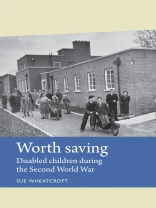Early in the war, when faced with an acute shortage of accommodation for evacuees, a government official questioned whether disabled children were ‘worth saving’. This book examines how the evacuation in England was planned, executed and evaluated for children with various disabilities (including the ‘excluded’) and explores how this wartime experience influenced public and professional attitudes towards the children long after the war had ended.
Through the use of official documents, newspapers and personal testimony, the book illustrates both positive and negative experiences of the government evacuation scheme, and shows the impact of the attitudes held by the authorities, the general public, and the teaching and nursing staff. It demonstrates how wartime conditions changed special education, both during and after the war, and will appeal to social and medical historians, as well as those studying childhood, the voluntary sector and social policy.
قائمة المحتويات
Introduction
1. Pre-war developments
2. Residential special schools during wartime
3. Special day schools, hospital schools and the role of charities
4. Hostels and institutions
5. Post-war change
Conclusion
Bibliography
Index
عن المؤلف
Sue Wheatcroft is Honorary Visiting Fellow at the University of Leicester












